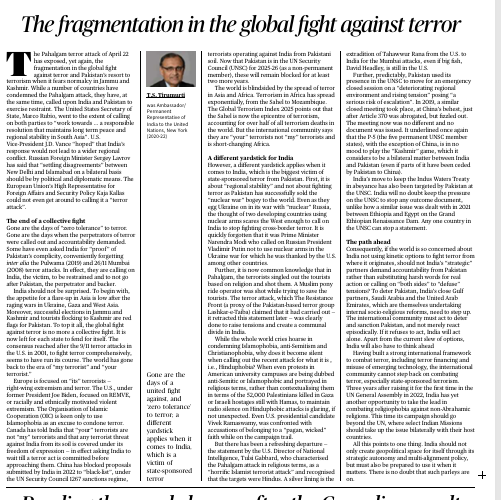UPSC Mains Questions (GS Paper II & III)
GS Paper II – International Relations
Q1. The global consensus on counterterrorism is increasingly fragmented. Discuss how this impacts India’s security and diplomatic interests.
(15 marks)
Introduction:
The recent terror attack on Chinese engineers in Pakistan’s Khyber Pakhtunkhwa region and the subsequent lack of uniform global response highlights a growing fragmentation in the global counterterrorism framework. This raises concerns for countries like India that have long been victims of cross-border terrorism.
Body:
A. Evidence of Fragmentation
- Lack of clarity at the UN: UN Security Council’s failure to define terrorism comprehensively (due to veto politics).
- Selective application of counterterror norms:
- West condemns ISIS or al-Qaeda strongly but shows leniency toward “good terrorists” aligned with state interests (e.g., Afghan Taliban).
- Inconsistency in applying FATF rules and sanction mechanisms.
- West condemns ISIS or al-Qaeda strongly but shows leniency toward “good terrorists” aligned with state interests (e.g., Afghan Taliban).
- Pakistan as an example:
- Hosts terror networks targeting India.
- Receives strategic and financial support from global powers due to its geopolitical utility (e.g., U.S. during Afghan War, China’s CPEC projects).
- Hosts terror networks targeting India.
B. Implications for India’s Security
- Weakens global pressure on Pakistan:
- Despite being on FATF grey list, Pakistan has escaped real punitive actions.
- China repeatedly blocked India’s attempt to list Pakistani-based terrorists under UNSC 1267.
- Erosion of deterrence:
- Fragmented responses embolden non-state actors.
- Reduces diplomatic cost for countries using terrorism as a strategic asset.
- Threat to regional stability:
- Destabilizes India’s western border, especially in J&K, Punjab, and Afghanistan-linked areas.
C. Diplomatic Repercussions
- India’s efforts at international forums (UNGA, BRICS, SCO) to push for Comprehensive Convention on International Terrorism (CCIT) have seen limited progress.
- Perception that India is isolated in its fight unless attacks target Western interests.
- Affects India’s ability to build coalitions on counterterror issues, limiting strategic leverage.
D. Way Forward
- Bilateral Counter-Terror Agreements:
- Strengthen ties with like-minded countries (e.g., France, Israel, Australia).
- Strengthen regional cooperation:
- Use platforms like BIMSTEC and IORA to build regional CT cooperation.
- Global advocacy for CCIT:
- Revive push for uniform definition of terrorism.
- Use multilateral platforms for naming & shaming:
- India should strategically expose double standards and support intelligence-sharing frameworks.
Conclusion:
Terrorism remains a transnational threat, but the global response is often divided along geopolitical lines. For India, building coalitions, exposing duplicity, and pushing for norms-based order is crucial to safeguarding its interests and ensuring that terrorism is universally condemned and prosecuted — irrespective of geography or sponsor.


